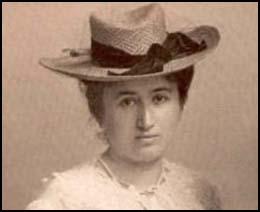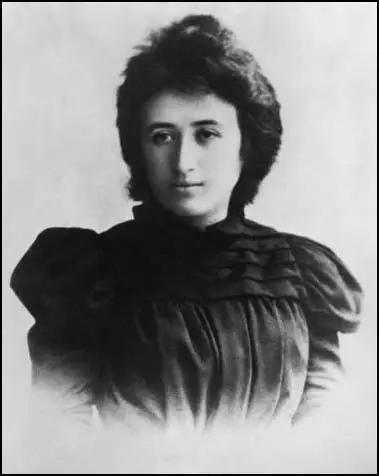Rosa Luxemburg
Rosa Luxemburg, the youngest of five children of a lower middle-class Jewish family was born in Zamość, in the Polish area of Russia, on 5th March, 1871. She became interested in politics while still at school. At sixteen, when she graduated at the top of her class from the girls' gymnasium in Warsaw, she was denied the gold medal because of "an oppositional attitude toward the authorities."
In an attempt to escape the authoritarian government of Alexander III, Rosa Luxemburg emigrated to Zurich in 1889 where she studied law and political economy. A fellow student was Julian Marchlewski. According to their friend, Paul Frölich: "Marchlewski has described in his memoirs (unfortunately unpublished) how the satire of the young students made life difficult for Professor Wolf. They used to hatch little plots before the seminar classes. Predetermined questions were submitted to the master in all innocence. Then when Wolf had hopelessly entangled himself, Rosa Luxemburg would get up and demonstrate his professional incompetence point by point. Apparently Julius Wolf took the malicious game with the necessary sense of humour; in an autobiographical sketch he paid great tribute to his best pupil."
Bertram D. Wolfe has pointed out: "Physically, the girl Rosa did not seem made to be a tragic heroine or a leader of men. A childhood hip ailment had left her body twisted, frail, and slight. She walked with an ungainly limp. But when she spoke, what people saw were large, expressive eyes glowing with compassion, sparkling with laughter, burning with combativeness, flashing with irony and scorn. When she took the floor at congresses or meetings, her slight frame seemed to grow taller and more commanding. Her voice was warm and vibrant (a good singing voice, too), her wit deadly, her arguments wide ranging and addressed, as a rule, more to the intelligence than to the feelings of her auditors."
Rosa Luxemburg in Switzerland
While in Switzerland she met other socialist revolutionaries from Russia living in exile including, Alexandra Kollontai, George Plekhanov and Pavel Axelrod. In 1890 she met Leo Jogiches and they began "a lifelong personal intimacy (without benefit of religious or civil ceremony)". Luxemburg married Gustav Lubeck in 1898 in order to gain German citizenship. She now settled in Berlin where she joined the Social Democratic Party. A committed revolutionary, Luxemburg campaigned with Karl Kautsky against the revisionist Eduard Bernstein, who argued that the best way to obtain socialism in an industrialized country was through trade union activity and parliamentary politics.
In 1903 Luxemburg, Leo Jogiches and Julian Marchlewski, to form the Social Democratic Party of Poland. As it was an illegal organization, she went to Paris to edit the party's newspaper, Sprawa Robotnicza (Workers' Cause). While in France she became friends with Jean Jaurès and Édouard-Marie Vaillant.
Rosa Luxemburg and Lenin
Luxemburg disagreed with the theories of Lenin. In 1904 she published Organizational Questions of the Russian Democracy, where she argued: "Lenin’s thesis is that the party Central Committee should have the privilege of naming all the local committees of the party. It should have the right to appoint the effective organs of all local bodies from Geneva to Liege, from Tomsk to Irkutsk. It should also have the right to impose on all of them its own ready-made rules of party conduct... The Central Committee would be the only thinking element in the party. All other groupings would be its executive limbs." Luxemburg disagreed with Lenin's views on centralism and suggested that any successful revolution that used this strategy would develop into a communist dictatorship.
1905 Russian Revolution
During the 1905 Revolution Luxemburg and Leo Jogiches returned to Warsaw where they were soon arrested. Luxemburg's experiences during the failed revolution changed her views on international politics. Until then, Luxemburg believed that a socialist revolution was most likely to take place in an advanced industrialized country such as Germany or France. She now argued it could happen in an underdeveloped country like Russia.
At the Social Democratic Party Congress in September 1905, Luxemburg called for party members to be inspired by the attempted revolution in Russia. "Previous revolutions, especially the one in 1848, have shown that in revolutionary situations it is not the masses who have to be held in check, but the parliamentarians and lawyers, so that they do not betray the masses and the revolution." She then went onto quote from The Communist Manifesto: "The workers have nothing to lose but their chains; they had a world to win."

August Bebel, the leader of the SDP, did not share Luxemburg's views that now was the right time for revolution. He later recalled: "Listening to all that, I could not help glancing a couple of times at the toes of my boots to see if they weren't already wading in blood." However, he preferred Luxemburg to Eduard Bernstein and he appointed her to the editorial board of the SPD newspaper, Vorwarts (Forward). In a letter to Leo Jogiches she wrote: "The editorial board will consist of mediocre writers, but at least they'll be kosher... Now the Leftists have got to show that they are capable of governing."
Rosa Luxemburg on Revolution
In 1906 Luxemburg published her thoughts on revolution in The Mass Strike, the Political Party and the Trade Unions. She argued that a general strike had the power to radicalize the workers and bring about a socialist revolution. "The mass strike is the first natural, impulsive form of every great revolutionary struggle of the proletariat and the more highly developed the antagonism is between capital and labour, the more effective and decisive must mass strikes become. The chief form of previous bourgeois revolutions, the fight at the barricades, the open conflict with the armed power of the state, is in the revolution today only the culminating point, only a moment on the process of the proletarian mass struggle."
These views were not well received by August Bebel and other party leaders. In a letter to Clara Zetkin she wrote: "The situation is simply this: August Bebel, and still more so the others, have completely spent themselves on behalf of parliamentarism and in parliamentary struggles. Whenever anything happens which transcends the limits of parliamentarism, they are completely hopeless - no, even worse than that, they try their best to force everything back into the parliamentary mould, and they will furiously attack as an enemy of the people anyone who wants to go beyond these limits."

In 1907 Luxemburg began teaching at the Social Democratic Party school in Berlin. According to Bertram D. Wolfe: "Unlike other German pundits, who did little more than repeat Marx's formulae in new works, she developed first an original, mildly heretical interpretation of the labour theory of value (Introduction to National Economy) then ventured to cross swords with Marx himself in a critical appraisal and revision of the arid and weak Second Volume of Das Kapital."
Rosa Luxemburg on Karl Liebknecht
Luxemburg began working closely with Karl Liebknecht, a leading figure in the anti-militarist section of the SDP. In 1907 he published Militarism and Anti-Militarism. In the book he argued: "Militarism is not specific to capitalism. It is moreover normal and necessary in every class-divided social order, of which the capitalist system is the last. Capitalism, of course, like every other class-divided social order, develops its own special variety of militarism; for militarism is by its very essence a means to an end, or to several ends, which differ according to the kind of social order in question and which can be attained according to this difference in different ways. This comes out not only in military organization, but also in the other features of militarism which manifest themselves when it carries out its tasks. The capitalist stage of development is best met with an army based on universal military service, an army which, though it is based on the people, is not a people’s army but an army hostile to the people, or at least one which is being built up in that direction."